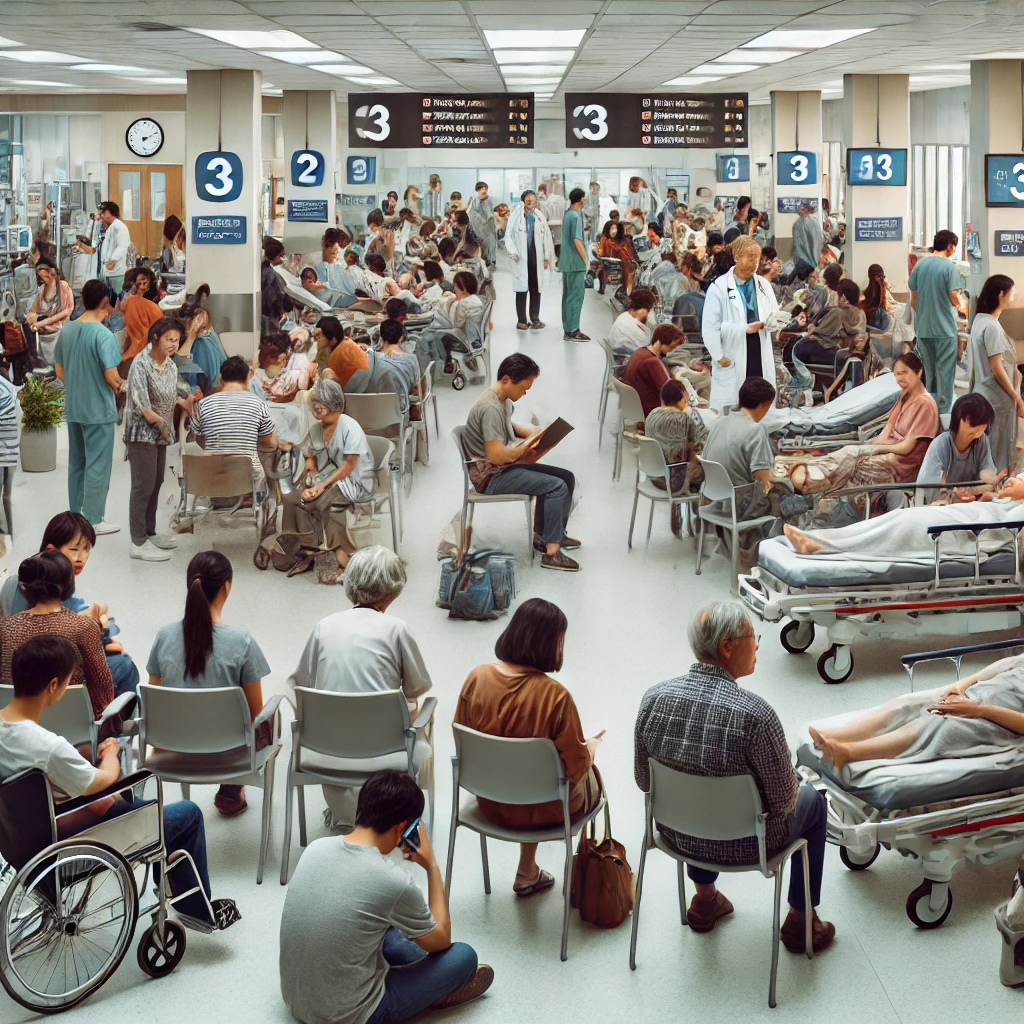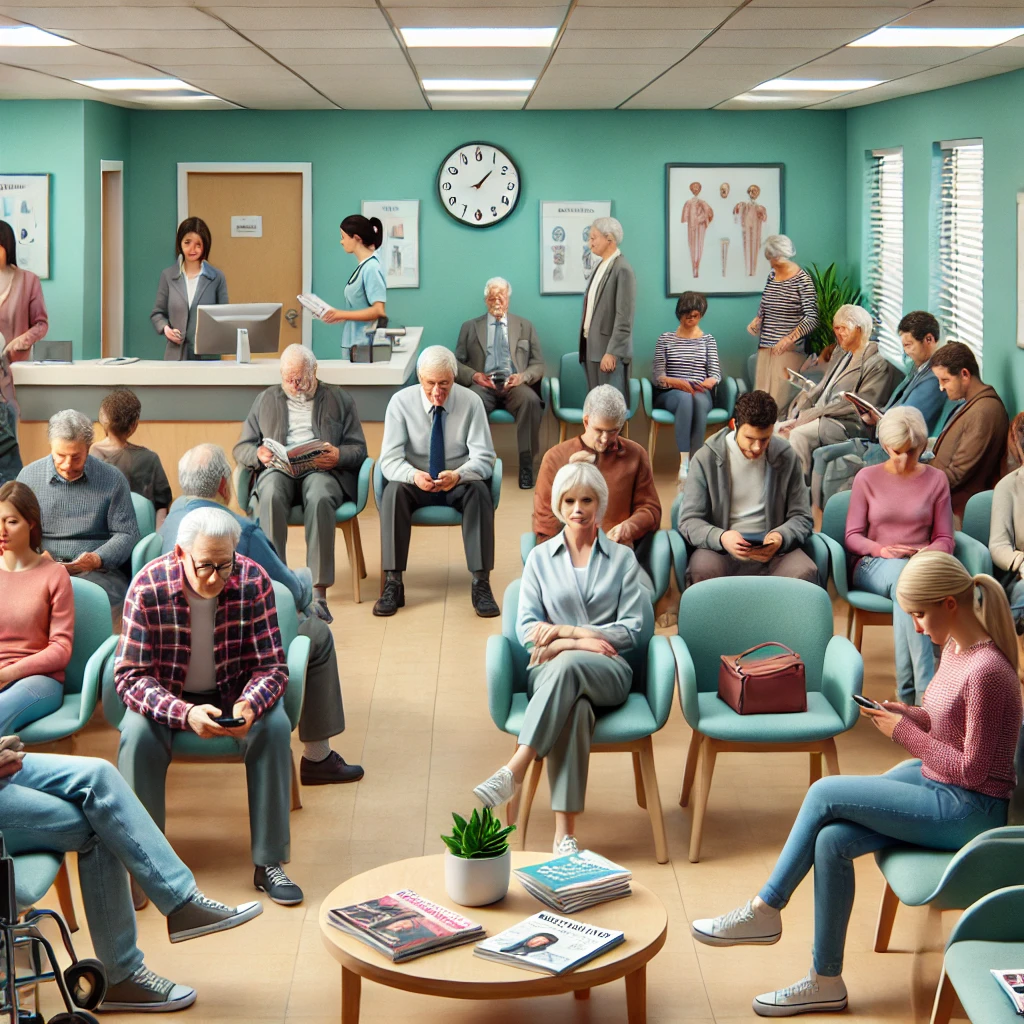
Introduction
Yes, it’s hard waiting in this room. I get it, I really do! After many years as an emergency doc I really understand what it’s like for you to be waiting for treatment for yourself or family members. It’s particularly stressful during the holiday season when emergency departments are crowded and no one wants to inconvenience family or friends by having to make a trip to the hospital. I have spent quite a few Christmases in the emergency department, so I’ve seen first hand how difficult it can be for patients and families to try to celebrate their holidays in the hospital. (By the way, that’s me in the white coat.)
If you do need to go to the emergency department, be sure and check in with the triage nurse soon as you get there. Give as detailed a description of your symptoms as possible. The more information you provide, the better job the nurse can do of triaging you. Triage is method that emergency departments use to determine who needs to be seen first. It’s not first come first served. If at any time your symptoms change during your stay, you need to immediately notify the nurse.
During the holiday season emergency departments are frequently over crowded and under staffed. This can lead to long delays. If at all possible you should have someone with you in case you do start having problems they can immediately notify the nursing staff for you.
A word of caution. There is a common misconception that taking an ambulance will get you to the head of the line. This is not true. Even if you arrive by ambulance, if your initial assessment does not indicate an emergent condition, you may be triaged to the waiting room. Additionally, your insurance company may refuse to cover the ambulance trip for a non emergent condition.
Now, here’s the big but… A lot of people delay seeking medical care during the holiday season with sometimes disastrous results. Below are 10 reasons that you should seek medical care at any time and particularly during the stressful holiday season.
1. Chest Pain
- Symptoms: Pressure, tightness, or discomfort in the chest, which may radiate to the arms, back, neck, or jaw, often accompanied by shortness of breath, excessive sweating, or nausea. Women and diabetics may experience milder symptoms, such as isolated fatigue, dizziness, or nausea, and should maintain a high degree of suspicion.
- Potential Outcomes If Ignored: Chest pain could signal a heart attack, potentially leading to heart muscle damage, heart failure, or death if not treated promptly.
- Action: Seek emergency care. Call 911 or visit an emergency department (ED) immediately, as timely intervention can be life-saving. Contact your PCP for chest pain primarily in the chest wall, especially if it worsens with coughing or movement.
2. Severe Shortness of Breath
- Symptoms: Difficulty breathing, wheezing, gasping for air, or an inability to catch your breath.
- Potential Outcomes If Ignored: Severe shortness of breath could indicate conditions like asthma, pneumonia, pulmonary embolism, or heart failure. If untreated, it may lead to respiratory failure or sudden death.
- Action: Seek emergency care immediately. Severe shortness of breath requires prompt evaluation in the ED to determine the cause and provide necessary treatments. Mild shortness of breath with activity or when lying flat should be assessed by your PCP.
3. Sudden Weakness, Numbness, or Difficulty Speaking
- Symptoms: Sudden loss of strength or sensation, particularly on only one side of the body, difficulty speaking, confusion, or trouble walking or holding objects.
- Potential Outcomes If Ignored: These symptoms often indicate a stroke. Without prompt treatment, brain damage can occur quickly, leading to permanent disability or death. If the symptoms resolve on their own, it could be a transient ischemic attack (TIA), a warning sign of an impending stroke.
- Action: Seek emergency care. Call 911 immediately. Early treatment can significantly improve recovery outcomes. Do not ignore TIA symptoms, as a stroke may follow shortly.
4. Severe Abdominal Pain
- Symptoms: Sharp or intense pain in the stomach area, often accompanied by nausea, vomiting, or fever.
- Potential Outcomes If Ignored: Severe abdominal pain could indicate appendicitis, bowel obstruction, or gallbladder disease. Untreated, these conditions can lead to infections or organ damage.
- Action: Seek emergency care for sudden, intense pain. For persistent but less severe pain, contact your PCP for evaluation.
5. High Fever with Severe Symptoms
- Symptoms: A fever over 103°F (39.4°C), especially if accompanied by confusion, headache, weakness, dizziness, stiff neck, rash, or difficulty breathing.
- Potential Outcomes If Ignored: High fever with severe symptoms may indicate serious infections like meningitis or sepsis, which can rapidly become life-threatening.
- Action: Seek emergency care for high fevers with concerning symptoms. For lower but persistent fevers, consult your PCP.
6. Persistent Cough or Coughing Up Blood
- Symptoms: A cough lasting more than three weeks, wheezing, or producing blood-streaked mucus.
- Potential Outcomes If Ignored: A chronic cough could be a sign of lung infections like pneumonia, chronic obstructive pulmonary disease (COPD), or even lung cancer. Coughing up blood may indicate a severe infection or pulmonary embolism.
- Action: Contact your PCP for a persistent cough. Seek emergency care if you are coughing up blood or experiencing severe symptoms like high fever or shortness of breath.
7. Severe Allergic Reaction (Anaphylaxis)
- Symptoms: Swelling of the throat, lips, or tongue; difficulty breathing; rapid heartbeat; or dizziness following exposure to an allergen.
- Potential Outcomes If Ignored: Anaphylaxis can be life-threatening if not treated immediately, potentially leading to shock or death.
- Action: Seek emergency care. Use an epinephrine auto-injector if available and call 911 or go to the ED right away.
8. Sudden, Severe Headache
- Symptoms: Intense headache that comes on suddenly, often described as the “worst headache of your life”, sometimes accompanied by vomiting or visual changes.
- Potential Outcomes If Ignored: A sudden, severe headache could indicate a brain aneurysm or stroke. Ignoring these symptoms may result in brain damage or death.
- Action: Seek emergency care. Immediate attention is necessary, especially if the headache is accompanied by neurological symptoms like weakness or vision changes.
9. Sudden Vision Loss or Changes
- Symptoms: Sudden blurred vision, double vision, or complete or partial loss of vision in one or both eyes.
- Potential Outcomes If Ignored: Sudden vision changes may indicate retinal detachment, stroke, or another neurological issue. Without treatment, permanent vision loss or brain damage can occur.
- Action: Seek emergency care if vision loss is sudden or accompanied by other symptoms like headache or weakness. For gradual vision changes, consult your PCP or an ophthalmologist.
10. Unexplained Weight Loss or Fatigue
- Symptoms: Significant, unintended weight loss or extreme fatigue persisting without a clear cause.
- Potential Outcomes If Ignored: Unexplained weight loss or fatigue could signal serious underlying conditions such as cancer, diabetes, thyroid disorders, or depression. Delayed diagnosis and treatment may lead to worsening health.
- Action: Contact your PCP. While not usually an emergency, a comprehensive evaluation is needed to identify and address the underlying cause.
Conclusion
Recognizing when to seek medical attention can be life-saving. For severe, sudden symptoms like chest pain, shortness of breath, or signs of a stroke, emergency care is essential. For more gradual or less urgent issues, your primary care physician can provide diagnosis, guidance, and treatment. Don’t wait—early intervention often prevents serious complications down the road.


Leave a Reply